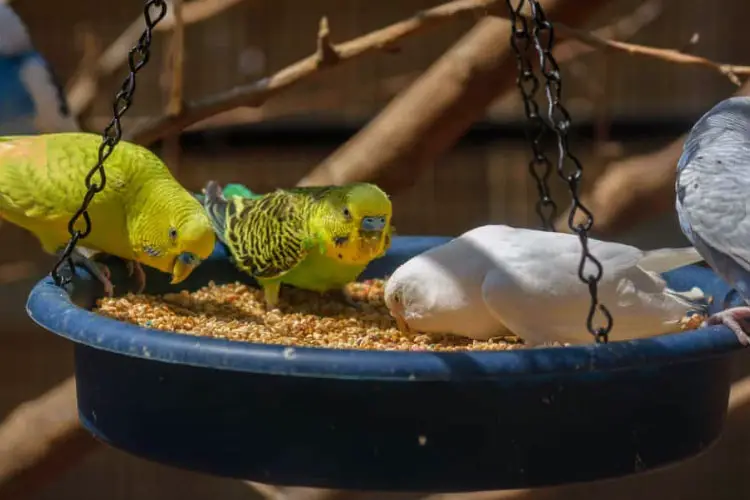If you’re wondering whether it’s safe for budgies to stay outdoors in winter, this guide is for you. You’re probably wondering if your budgies can tolerate harsh winter conditions or if it’s too much for them to bear.
So, can budgies live outside in winter? No. Your pet budgies shouldn’t be kept outside during cold winters as they’re not biologically designed to tolerate chilly weather. Their small body makes it hard for them to regulate their body temperatures and cold weather can easily kill them.
This article discusses more helpful details on whether it’s safe for your budgies to live outside in winter, what measures you can take in place to keep them warm, and other helpful info.
Can Budgies Live Outside in Winter?
You shouldn’t let your budgies stay outdoors during winter. These birds are sensitive creatures and are not wired to tolerate cold winter weather.
Their ideal temperature range should stay between 70 and 75 degrees.
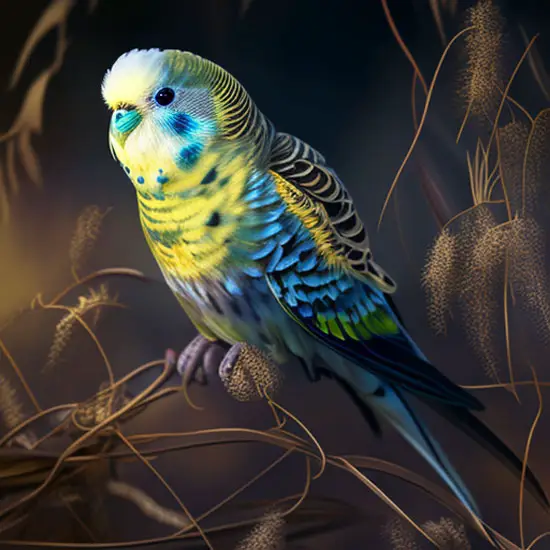
Budgies also can’t regulate their body temperature due to their small body size.
And although they may be able to tolerate colder temperatures for a while, it won’t be long before hypothermia catches up with them.
The adult budgies may be able to tolerate temperatures below 60 degrees for some time. Temperatures below 50 degrees are considered too cold for these little birds, especially during winter.
Old budgies are even more vulnerable to the cold winters compared to adult budgies.
Note that even if your budgie survives a few hours of cold, it doesn’t guarantee that it won’t fall ill from exposure to the cold weather.
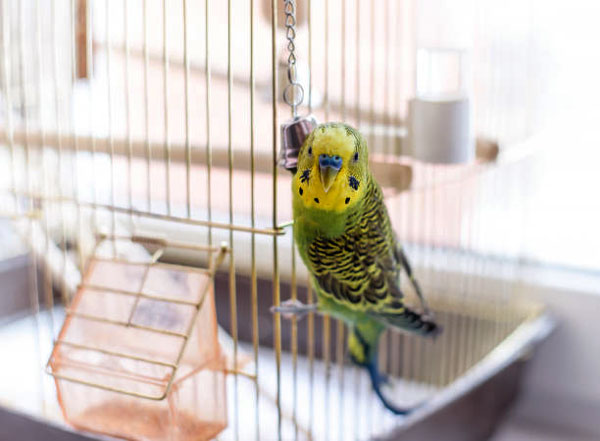
That said, some budgies may just get lucky and survive the harsh weather. A perfect example is this pet budgie that escaped and was able to survive for a whole winter month in Southland Park, in the Island Lake Area.
This bird was lucky enough to be adopted and cared for by a flock of sparrows but it was eventually rescued and reunited with its owner.
Dangers of keeping your budgies outside in winter
When exposed to winter weather, budgies can become seriously ill and may even die.
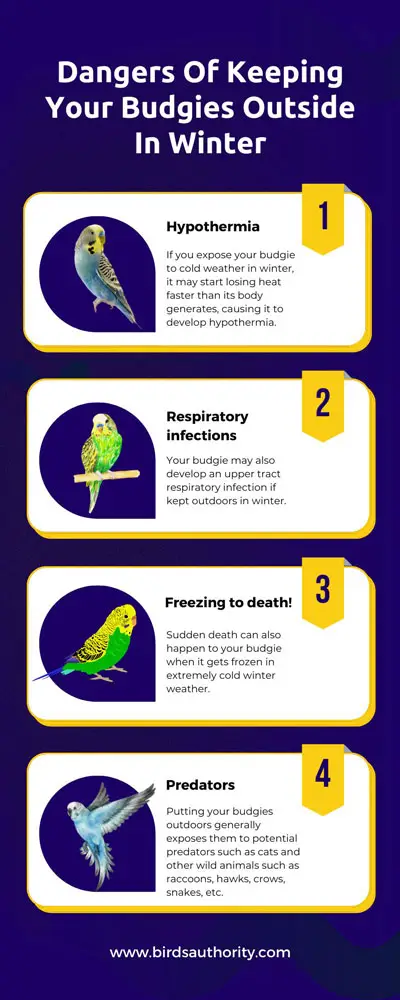
Here are the most common dangers your budgie will get exposed to if you leave it outside in winter:
Hypothermia
If you expose your budgie to cold weather in winter, it may start losing heat faster than its body generates, causing it to develop hypothermia.
You can easily tell if your budgie is in this state if it’s shivering a lot and seems drowsy.
An adult budgie can withstand cold temperatures for around 6 hours, but hypothermia sets in after 12 to 24 hours.
Warming your budgie to normal temperatures can help easily reverse this condition.
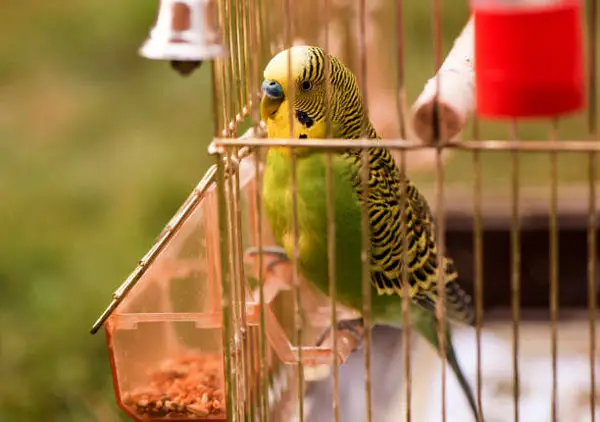
Respiratory infections
Your budgie may also develop an upper tract respiratory infection if kept outdoors in winter. Te bacteria that thrive in cold weather will easily attack the upper respiratory tract.
Since the bird’s immune is already susceptible to the chilly weather at this point, it will fall ill easily.
Key symptoms of this infection include a runny nose, sneezing, difficulty breathing, and coughing.

Immediately you notice these signs, you should seek veterinary help asap to get your animal treated on time and increase its chances of recovery.
Freezing to death!
Sudden death can also happen to your budgie when it gets frozen in extremely cold winter weather.
This is usually the case for folks who live in areas that experience harsh winters with snow, and the temperature may hit the negative spectrum.
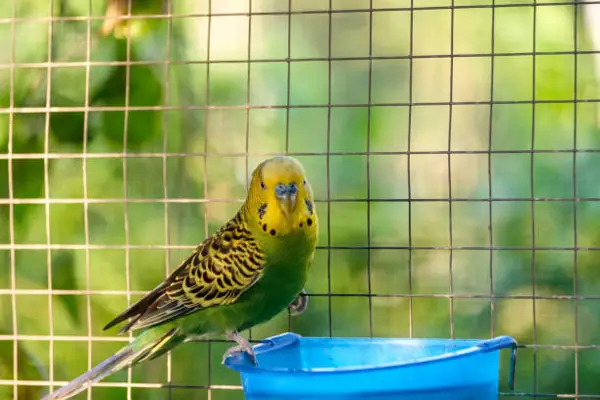
If you haven’t put any measures in place to winter-proof your budgies in an outdoor aviary, then they may get stuck by the student change in climate and die!
Predators
Putting your budgies outdoors generally exposes them to potential predators such as cats and other wild animals such as raccoons, hawks, crows, snakes, etc.
For this reason, protection from predators is a key consideration before moving your budgies outside. And this usually involves not leaving your budgie cage unattended.
So, are you ready to spend hours outside during winter guarding your feathered friend against predators??
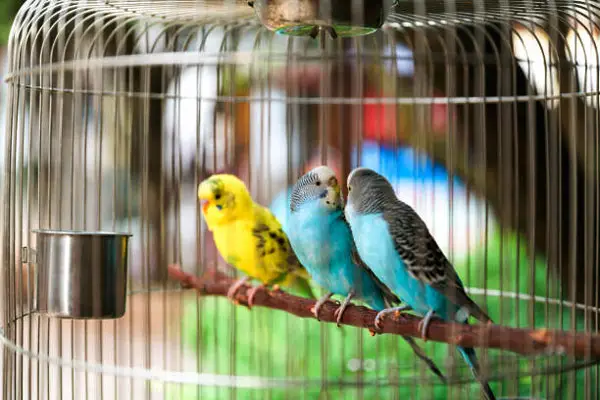
How to winterproof your budges?
If you’re worried that winter might get the better part of your budgie, use these tips to keep it warm and safe from the harsh weather:
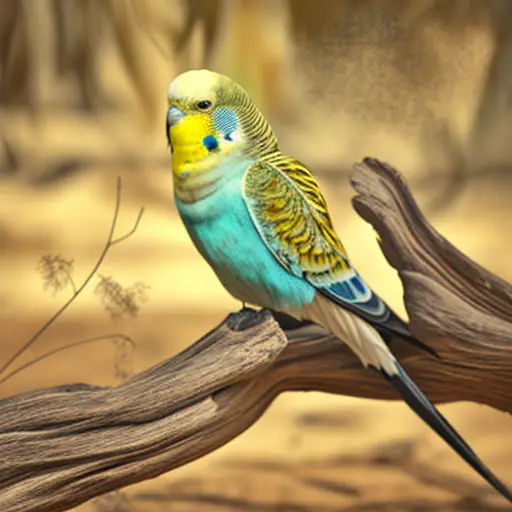
- Keep your budgie cage warm by installing heaters and maintaining them at the ideal temperatures, depending on your budgie’s age.
- Heated perches will also help your budgies stay warm by sitting and even seeping on them.
- Use a humidifier to maintain proper humidity levels in your budgie’s cage as the constant heating of the budgie’s cage can dry out your bird’s lungs and skin.
- Alternatively, you can gently mist your pet bird a few times every day to keep him moisturized.
- Get a cozy tent or tent for covering your bird’s shelter. This helps insulate your bird’s housing and keep your little guys warm.
- Since your budgies drinking water can get cold pretty quickly, be sure to frequently change it so that it stays at a warmer temperature.
- Get a cover for your budgie’s outdoor cage or aviary, to further help keep your budgie warm at night in winter.
- You should also tweak your budgie’s diet to give it more vitamins to boost its immunity.
How do you know if your budgie has caught a cold?
Monitoring health of your budgie is essential during winter. You can tell if your budgie has a cold by looking for key symptoms like:
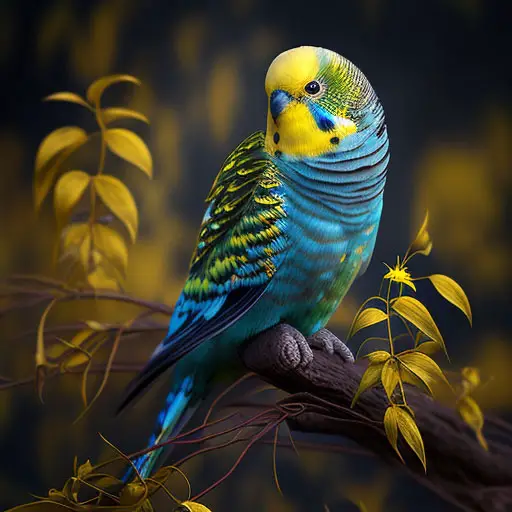
- Coughing and sneezing
- Inactivity
- Loss of appetite
- Breathlessness
- Nasal and eye discharge
- Crouching to keep warm
- Shivering
- Panting
- Excess urination, and
- Fluffed up feathers
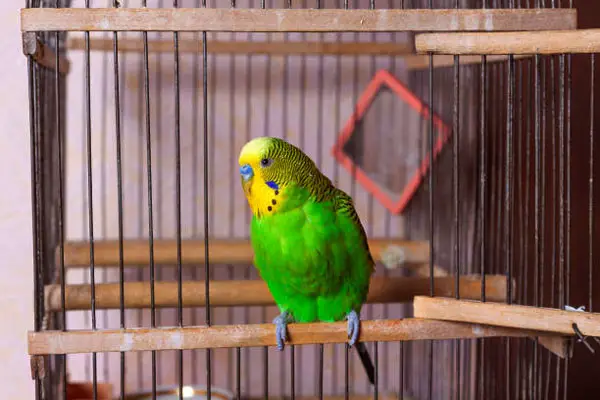
Your budgie may not show all these symptoms at the same time. But if it shows a handful of them, take him to an avian vet immediately.
FAQs:
Anything less than 50 degrees Fahrenheit (or 10 degrees Celsius) is considered extremely cold for your budgies.
If you have your budgie outside in the winter and he feels cold, he’ll most likely fluff up his feathers, become lethargic, crouch in corners to stay warm, refuse to eat, discharge fluids from his eyes and nose, or even sneeze, shiver, and cough.
Final Verdict
It is not safe for captive budgies to live outside in winter. These little birds are highly sensitive to temperature changes and their small bodies aren’t biologically wired to tolerate low temperatures. Possible dangers of exposing your budgie to winter weather include respiratory infections, hypothermia, and in worse cases, sudden death by freezing!
Follow the tips we’ve provided in the above guide to keep your budgies warm during the cold winter season. And keep monitoring the behavior of your pet budgies during this season as well. If you notice any signs of illness, take it to the vet immediately to get it diagnosed and treated.
